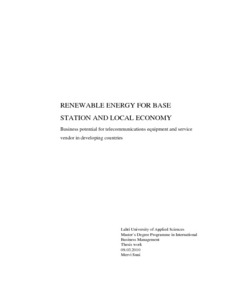Renewable energy for base station and local economy : business potential for telecommunications equipment and service vendor in developing countries
Suni, Mervi (2010)
Suni, Mervi
Lahden ammattikorkeakoulu
2010
All rights reserved
Julkaisun pysyvä osoite on
https://urn.fi/URN:NBN:fi:amk-201003195784
https://urn.fi/URN:NBN:fi:amk-201003195784
Tiivistelmä
The main objective of this work is to define the business potential the telecommunication sector has in rural areas in developing countries. One way to enter the market is through a coalition which empowers the local community; people living in rural areas in developing countries often lack access to telecommunication services and electricity. Radio base station sites in rural environment generally use diesel as a power source and the local community uses, for example, kerosene to provide lighting and fire wood for cooking.
The study was conducted based on literature review and interviewing professionals in energy and business areas with experience and deep knowledge about the developing countries. Some renewable energy resources which exist in large amounts in developing countries were presented. As the solar photovoltaic and wind solutions require relatively big investment, the biomass based solutions and picohydro power can be implemented by the local people because of the smaller capital expenses. By utilizing the Jatropha plant oil, a price around 0, 40 € / kWh was resulted. Biogas (generated through the anaerobic digestion) on the other hand got a result of 0.176 € / kWh. The concerns regarding poor salary levels of agricul-tural workers are discussed in chapter five.
The study presents a model for a business coalition which has many factors of economic growth embedded in it. Capital, technology, education and entrepreneurship are, for example, factors impacting economic growth and thus decreasing poverty. Also the endogenous factors like skills and education have great effect on the empowerment of the local people.
Companies in the telecommunication sector should be patient with the local economic growth of rural communities in developing countries. In addition, both systemic and open innovations are needed in order to create sustainable business. The short term benefit is, on the other hand, available for the local community already earlier in the mode of decreased poverty.
The study was conducted based on literature review and interviewing professionals in energy and business areas with experience and deep knowledge about the developing countries. Some renewable energy resources which exist in large amounts in developing countries were presented. As the solar photovoltaic and wind solutions require relatively big investment, the biomass based solutions and picohydro power can be implemented by the local people because of the smaller capital expenses. By utilizing the Jatropha plant oil, a price around 0, 40 € / kWh was resulted. Biogas (generated through the anaerobic digestion) on the other hand got a result of 0.176 € / kWh. The concerns regarding poor salary levels of agricul-tural workers are discussed in chapter five.
The study presents a model for a business coalition which has many factors of economic growth embedded in it. Capital, technology, education and entrepreneurship are, for example, factors impacting economic growth and thus decreasing poverty. Also the endogenous factors like skills and education have great effect on the empowerment of the local people.
Companies in the telecommunication sector should be patient with the local economic growth of rural communities in developing countries. In addition, both systemic and open innovations are needed in order to create sustainable business. The short term benefit is, on the other hand, available for the local community already earlier in the mode of decreased poverty.
